| |
"My job is to be a barometer for their performances and a sounding board for them, but when you have actors at the calibre that I've been lucky enough to work with, they really know how to do it. There's a lot of bullshit talk about directing actors. You can't do it for them; you can nudge them. It's a bit like steering a boat: you only need to move that tether a tiny bit to get a lot of change in the actors." |
| |
Director Richard Loncraine* |
As a sobering but entertaining aside tenuously linked to the thrust (ahem) of this review, I visited the rather beautiful city centre of Bury St. Edmonds a few days ago and in looking for a remarkable story on a gravestone where a woman was punished for a man's sins (wasn't it always the way?), I was more attracted to Mary Haselton's sad tale. The pious nine year old (nine years old, it breaks the heart) was saying her prayers "repeating her Vespers (evening prayers)," when she was instantaneously struck and killed by lightning. This curious act both supports and disproves the existence of God in literally one fell swoop. Let's go from there then, shall we?
I imagine most Monty Python fans kept a cursory eye on any solo projects upon which the members embarked. You could always trust in Michael Palin's talent as a performer and writer so it was a no brainer to see The Missionary at the time of its original release. I remember it fondly but didn't think too much about its quality or attention to detail. Thirty-seven years on and after my second viewing, I'm thinking that my twenty-one year old self wasn't in the right frame of mind or mature enough to appreciate the subtleties of the piece. This again was probably due to the main character having a job I despised more than any other so it faded from memory more from personal prejudice than any other factor. But now, with all the experience I have accrued, its pleasures have hit me with a fuller flavour this time around. Missionaries, to me at some rebellious periods in my life (and if I were honest also right now), were arrogant, delusional and despicable. This isn't to say they didn't believe they were doing God's work. It's the doing God's work that's the problem. It's one thing to start believing in nonsense. It's another to browbeat a fellow national into believing the same. It's quite another thing entirely to take your bullshit to another culture, downgrade or obliterate said culture and shove yours in its place. I responded with gritted teeth hearing the Desmond Tutu quote... "When the missionaries came to Africa they had the Bible and we had the land. They said 'Let us pray.' We closed our eyes. When we opened them we had the Bible and they had the land." If my opinion offends some people then so be it. If I have very badly misjudged the role of the missionary then I am more than happy to be disabused. You can dispense kindness to other cultures without religion but why does it always seem to be in the name of religion? God knows...

Palin of course sets his simple myth-taker in Africa at the start of his story where he dispenses Church of England virtues to the Samburu people of northern Kenya in the first years of the twentieth century. These lovely, golden light images serve as a pretty bed for the front credits and as the crew was there filming for a week, you can imagine how dissatisfied (says make up man Lintott in the extras) the Africans would be to be so thrown away in the film. Incidentally, the Samburu have their own god who offers protection 24/7 to everyone unless an elder is disrespected whereby that protection is lifted and has to be earned back. As religions go, I admire its simplicity. Loaded with phallic totems, Palin heads back to Blighty with, one assumes, a different take on physical intimacy than the one he left with though this is never shown or confirmed specifically. You come to this conclusion based on the number of times he finds himself in compromising positions and grudgingly accepts his fate with all manner of women affected by his attractiveness. I'll say more about Palin as sex god a little later. Or rather I was going to until I realised the point had been brought up in one of the extra features.
Palin (as Rev. Charles Fortescue) has been away a decade which is long enough for him to forget what his fiancé looked like. Didn't think the English went in for pre-betrothing children but hey, the film was meticulously researched so what, indeed, do I know? He gazes lasciviously at the maid assuming she is the child he left behind until she corrects him. His real fiancé, a prim, proper and innocent Deborah, played beautifully by Phoebe Nichols, with all laces determinedly strait, thereby making her even more desirable. Fortescue is asked to find funds for a mission for 'fallen women' in the Docklands to "find out why they do what they do and ask them to stop it," in the words of his bishop, a delightfully wistful, sporting metaphor-using authoritarian Denholm Elliott. Attempting to tap the resources of one elderly rich couple ends in a domestic tragedy and off he goes to another stately home where he finds Lady Ames (a dependably convincing Maggie Smith) who is somewhat enamoured of Fortescue's bearing and makes no attempt to hide the fact she intends to have him come what may. Ooer. A bedroom with unlockable doors, a memory addled butler and a determined woman in a nightdress paints Fortescue into a corner. With a lovely shrug of inevitability, Palin (presumably) joins the already under the covers Lady Ames in joyful union. We cut from that scene a little sooner than completely necessary.
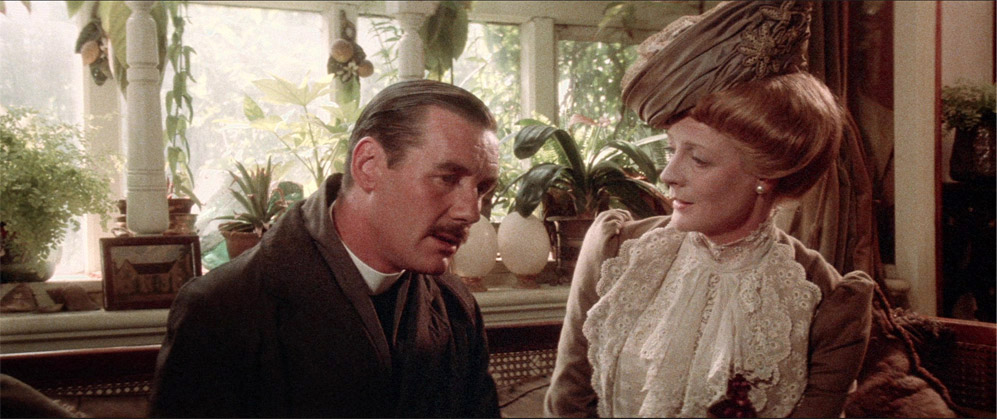
Financially covered (ahem, if you know anything about horses), Palin sets up his mission in the tawdriest streets of London. The first prostitute he finds, wearing a top that doesn't so much advertise features as present them as a fait accompli, has been approached before and knows how the religious play their 'saving souls' game. In order to prove that he is on her side, she offers him a freebie. We cut to Palin putting his hat down on the sideboard. Sex is all over The Missionary but nary a turned ankle is exposed for our titillation. Not quite true. There's some nudity, very brief and relevant but there's no sex if you don't include the very start of what prostitutes once coined 'below jobs'. There is a narrative lurch at the start of Act Three which everyone comments on in the various extras. They say it may be out of keeping with the buttoned down world of Palin's Fortescue who is now rendered as an action hero on the resplendent Scottish moors. But the inciting incident that brings about some desperate behaviour does stem from character moments and interaction so I didn't feel the Scottish scenes were off kilter at all. Not only was that no pun intended, it was no pun at all.
Two things rise up to the fore if you are paying attention. The first are the actors. Palin's cast is a marvel. In one of his first roles, Timothy Spall steals every scene he's in. Show me a sexier fully clothed scene than Phoebe Nichols caressing the wooden black phallic symbol while Nichols compliments Spall on his appearance. This is very far from the prim princess whose father (a relatively 'normal' Graham Crowden) once said about such objects, "Better not show them to Deborah. Take them up the back stairs..." Even that last phrase has entendres doubling by the minute. Outsider favourite, Michael Hordern is at his absolute best in this film. He's the sort of actor who placed a toe in middle-aged waters and was suddenly frozen there. His absent-minded butler is in a world of pure, delightful farce. He even gets a moment at the climax (I will "Ooer!" no longer) undressing the for the benefit of addled-brained Trevor Howard who invites him in to his bed. Poirot himself, David Suchet, plays a Scottish paramour anxious to do Maggie Smith's bidding. Neil Innes, the genius behind The Rutles (Wiki it) adds another Pythonic element as the hapless music hall singer/dancer. Apparently he was really knocked out by that chair... The second element that rewards close attention is the design and dressing of the sets. There is humour to be mined from the smallest detail and filmmakers that pay that much attention not only have my own, but my respect and admiration too.
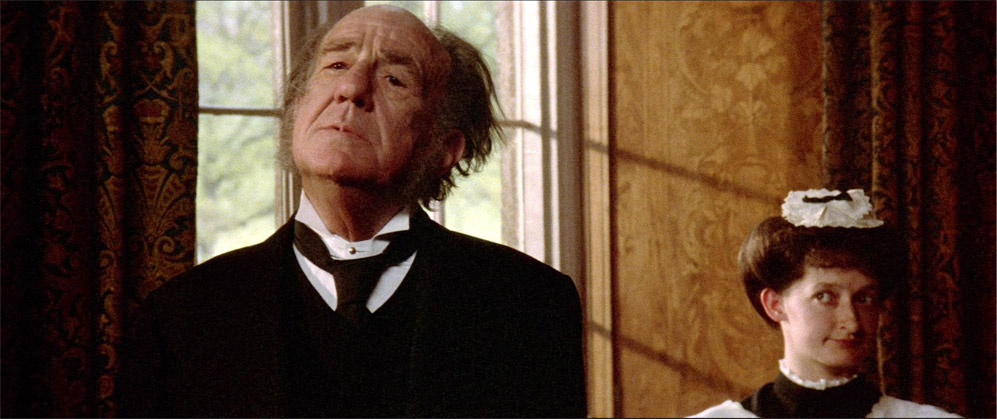
And now for something I touched upon earlier. Once again, thwarted by the Extra Features. I started talking about William Goldman's theory about stars in his rather wonderful book Adventures in the Screentrade. He suggested that actors egos are so fragile that the parts they played would have to show them in the most flattering light. I suggested that writing a starring part for yourself playing the role of a man seemingly irresistible to women might be construed as similar star-like behaviour but this is Michael Palin. And of course in Rob Deering's extra, he brings up exactly the same point. I'll let him elucidate for you... So let's get to the rest of the disk. There's a lot to savour from this unusual and undeservedly little known film.
The 2.35:1 aspect ratio presentation is a surprise. I saw the film back in 1982 in the cinema but nothing reminded me that of all films, The Missionary was shot in bold, cinematic, Panavision. This led to a whole new level of appreciation; Norman Garwood's art direction, Peter Hannan's cinematography and Loncraine's direction all sparkle on the bigger format. And the detail, so much fun to spot, is frame filling. The subject, star and nature of the film never made me think 2.35:1 but here it is. The colour palette is muted but the print is in fine shape with very few negative-related damage or spots and sparkle. There's a nice big white spot on Timothy Spall's close up in a clip played in one of the extras but I couldn't find that in the same scene in the actual film. Digital clean ups are so welcome.
The mono soundtrack has buffed up very nicely with dialogue clarity maintained and a more than usual dynamic range for the few music cues dotted around the film. This could be explained by the kit that I am playing it on but there was a richness to some of the cues that I'd not encountered before on older, mono recordings.
There are new and improved English subtitles for the deaf and hard-of-hearing.
Audio commentary with writer and actor Michael Palin (2002)
"Hopefully this is a comedy!", says Palin, seventeen years ago. He is our perfect guide to all the minutiae of film production right down to how many times he had to feign a trip of embarrassment. There is an extra level of comedy available by following this commentary as Palin points out bits of business that fly by on a first or even second viewing. For example, Timothy Spall is in a world of his own and there's great joy to be had looking beyond the foreground performers. Palin has the rare ability to laugh at his own script without seeming to be showing off in anyway. Apparently, Trevor Howard was a lovely man to work with but "he did have a slight drink problem..." a fact quite well established in the business at the time. Palin makes a delightful verbal typo that brought some very odd imagery into my mind citing the fact that Trevor Howard was in Close Encounters instead of Brief Encounter. I was somewhat crestfallen to learn that while Maggie Smith did indeed hide under the covers as Palin tried to look nonchalant, it wasn't Maggie Smith that subsequently simulated the start of a seriously sexual act. A small change in Palin's hairstyle gives away the time between filming the different scenes. Palin's criticism of the Victorian English at that time is limited to a few remarks about probity but he asks us to "learn from other people," and not feel like the rest of world has to be like us so we have to teach them our ways. Maggie Smith comes out of the commentary very well and I can just imagine her saying to Palin "Can't we get something with tyres on?" as a rickety cart takes her off the moor. A lovely commentary and I'm very much looking forward to the director's own.
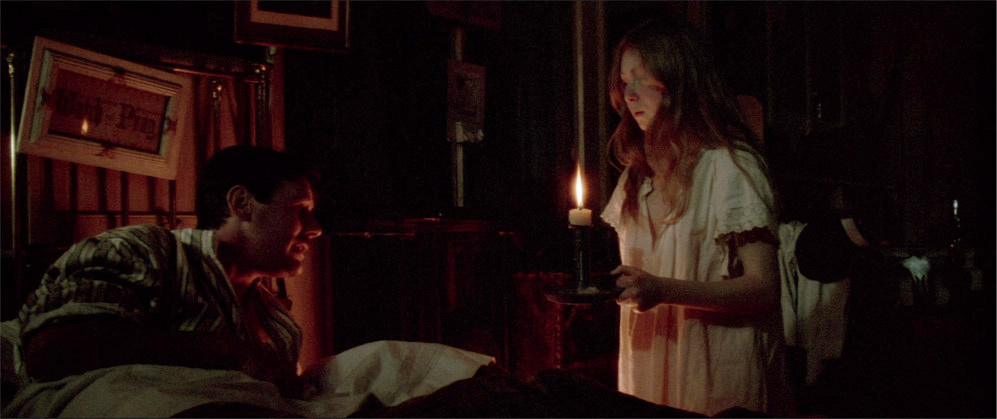
Audio commentary with director Richard Loncraine and film historian Sam Dunn (2019)
There's a marked difference between commentaries and it's all to do with the time at which they were recorded. In 2002, Palin would be aware that we have come a long way in filmmaking terms since 1982 but director Loncraine's was recorded this year and so inevitably, he's going to say that he would have cut faster if the film were made today. I feel the same about my own early work. The internet, to Loncraine is very good and very bad... Attention spans changing give him some pause. He has little time for critics and their cruelty. He describes one moment that certainly chimes with one experience I had on a film set. Loncraine would shout "Cut! That's a wrap!" and no one would go home. They just stayed and mingled with each other. That's a happy set. I did a six-week shoot in Africa and my small crew spent every minute with each other after work and it was glorious. My assistant married my sound recordist, a lovely reminder of how powerfully a film crew can bond. "I probably stalked him!" Loncraine says about Palin, connecting with the Pythons through an accountant of all things. Loncraine's past is something of an eye opener, a career sculptor and nascent actor for John Schlesinger of all people. Loncraine blipped on my radar directing one of the London Weekend Television Dennis Potter three part series with his film of Blade on a Feather.
In the middle of proceedings, Siri on Loncraine's Apple Watch interrupts with "Sorry Richard, I can't do that. You are not listening to the music app." There are many delightful stories (the Longleat family's Nazi tea set tops the list) but there is one thing Loncraine says of directing that really struck home. He said, "It's easy, really. You just get on with it!" Having directed myself (and am about to again for a voice over session in a few days) that really is great wisdom. A director is a charmer, a ringmaster who needs to pull this great train set behind him/her. You just get on with it!
Compulsively Entertaining (2019): Palin and Maggie Smith reflect on the making of The Missionary (37' 35")
I had a little wish beforehand that this would be one interview with both at the same time but alas. Palin is a very easy presence sharing his memories of the shoot. There's a great deal of detail and wistfulness in his recollection but it's never dull despite some expected repetition with the commentary. Maggie Smith, who has gained a huge reputation for exceptional work and having exacting standards, has only a small part of the running time (the interview is clearly from her time talking about Judith Hearne). But her memories are also entertaining. Both seem enamoured of the then thirty-six year old director, Richard Loncraine who was possessed of the energy and enthusiasm of a man in his early twenties. That passion has to be in the DNA of anyone directing a film, surely. Isn't the director the one who's pulling everyone else along with his/her enthusiasm for the project? This is a solid extra feature and all the more effective for both actors' up to date points of view.
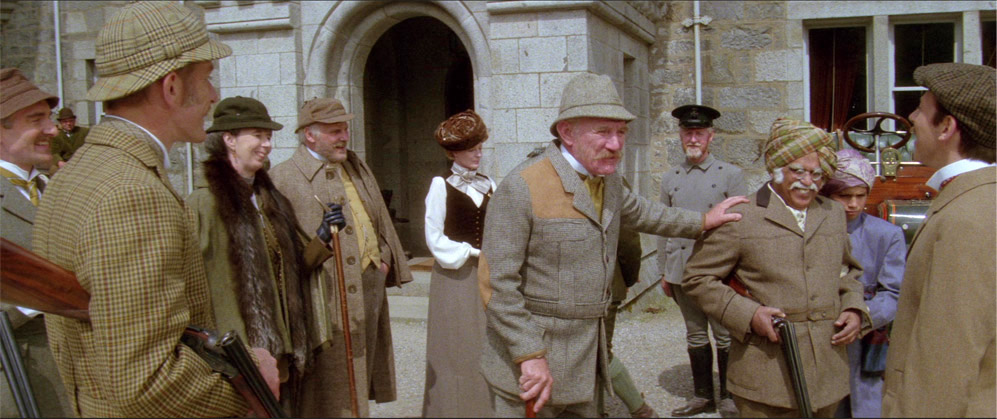
A Good Collar (2019): costume designer Shuna Harwood discusses her work on the film (7' 56")
Shuna confirms what was asked of her when the Samburu females refused to comply with historical accuracy and go topless. In the age of #metoo, this would never have even been thought much less suggested, to hell with accuracy. The costume designer was asked (get this) to go topless herself so that the African Samburu might follow suit. What? Well, no one should have to be asked to do such a thing and the single shot we see of bare-breasted women washing clothes is nothing of the sort. The neck ring adornment is so prominent that bare breasts can simply not been seen or bits of breast seen by the most enthusiastic breast-spotter with magnifying equipment. Poor Shuna had to spend a day in the sun sans top for absolutely nothing. But her recollections are mostly happy ones. Phew. I had visions of Loncraine and Palin in the dock for historical crimes of female exploitation. The more I think of this story, the more appalled I become. It's almost comical (my reaction). I mean, on a Michael Palin produced movie...
A Very British Sound (2019): veteran composer and record producer Mike Moran explores the score of The Missionary (8' 00")
When I saw the name, part of my 70s childhood paged the lower recesses of my brain. That can't be the Lynsey De Paul Mike Moran, can it? It can. Moran comes across as a delightful character that seems genuinely privileged to have worked on film scores with the greats (a nod to both Henry Mancini and Jerry Goldsmith). This short interview is dotted with useful information and he ends with the story of that crate of expensive champagne that Palin sent him after the production. I hope my composer is not reading this. His after film present is significantly more humble...
Playing the Part (2019): Ken Lintott recalls his approach to the film's make-up (3' 42")
Lintott has some lovely recollections about the director, the songs the crew would spontaneously break into (Palin's rather blue classic of "Sit on my face, and tell me that you love me...") and how disappointed the participants of the Samburu tribe in Kenya (Lintott mistakenly called them Maasai) might be if they saw the film. He even ends on a double entendre while talking about actors playing prostitutes. This disk is one big, shiny double-entendre, really.
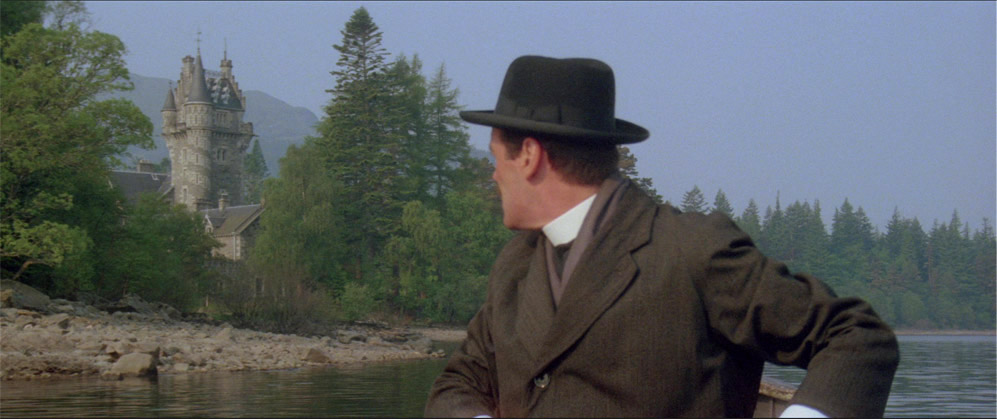
Snapshots of Sound (2019): interview with sound recordist Tony Jackson (10' 29")
Jackson shows a little Africa-savvy intelligence indicating that it was a good idea to stop filming while it's explained that running through the bush (especially if it's the star/writer/producer who's doing the running) is not a great idea until the path has been cleared of snakes. The generosity of Palin is noted, feeding lines off-screen to a child actor daunted by the whole filmmaking process.
A Stiff Old Fashioned (2019): appreciation by comedian, musician and writer Rob Deering (22' 27")
I wasn't aware of the work of Rob Deering before I chanced upon this extra but I will say this. If Rob Deering wants to add his opinions on every Blu-ray I review from now on, not only does he have my blessing, support and all round enthusiastic fervour, he also has my respect. Unless he is expertly reading cue cards, here is a man who is expounding on a film he is obviously very well disposed towards but the insight and the entertainment from his insights is palpable. And he does the pieces to camera with so much confidence based on his secure knowledge. He really knows what he's talking about and that's a quality whose cachet has risen in the past few years. It was Mr. Deering who brings up the subject of a man writing himself the lead role in a feature film, a character that is irresistible to women. And what does that say about most actors (but curiously not Michael Palin)?
Deleted scenes (mute with subtitled dialogue) (8' 25")
The Scale of the Problem features two side conversations in the gym saloon and in A Most Generous Man there's a sustained take of Palin trying to get money out of Peter Vaughn, the very first proper actor I ever met as they take a tour of his fizzy drinks factory. I guess the former was too inconsequential and the latter not funny enough to be deemed worthy of inclusion. Always a pleasure to see Peter Vaughn and only seeing him we did. The deleted scenes have no surviving audio, hence the subtitles as something of a must on viewing. The last lines of the second clip feature a derogatory term for African and it's to our current culture's credit (despite self-styled Social Justice Warriors, the far left's over-sensitivity on almost any issue and those regarded as 'snowflakes') that it made me wince when I saw the subtitled word.
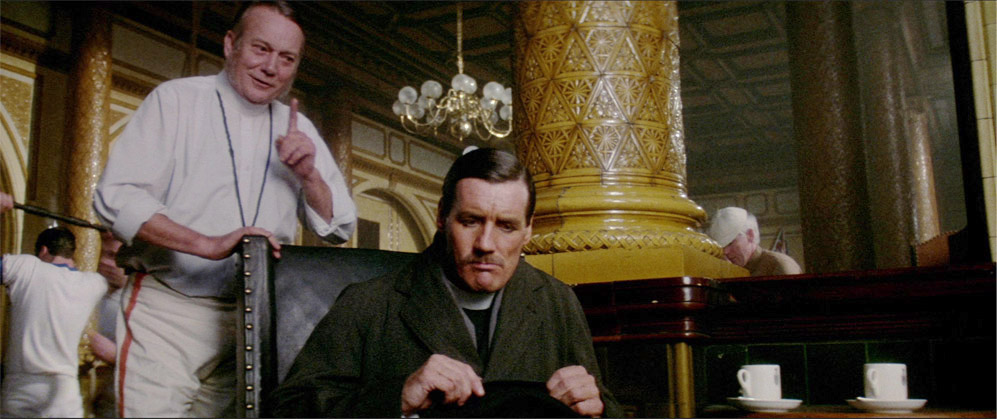
Original theatrical trailer (1' 38")
Very much geared towards the American market (reflected in the voiceover quoting the US poster), this is a standard issue trailer and titillating enough to attract the curious punter.
Image gallery: promotional and publicity material
This is a small collection of nine high contrast black and white shots, ten colour and the US and UK poster artwork.
Limited edition exclusive 40-page booklet with an extract from Robert Sellers' Very Naughty Boys: The Amazing True Story of HandMade Films, extracts from Palin's Halfway to Hollywood: Diaries 1980–88, Palin on The Missionary, an overview of contemporary critical responses, and film credits
The extracts from Seller’s excellent book on HandMade cover the genesis and production of the film with broader details than the minutiae regaled by Palin in his vivid and evocative diaries. All the shenanigans of filmmaking are laid bare, the highs and lows and having been involved in this business since 1982 (the year The Missionary was released) I share some of the experiences and emotions running raw during the making of any film though not from the loftier heights of Palin’s hyphenate role of writer/producer/actor. I'm not in a position to check, but isn't Denholm Elliott's full quote which starts the booklet extracts, "Find out why they do what they do and stop them doing it!"?
The penultimate piece is a mosaic of Palin interview selects taken from the time of the film's release. Finally there's the critical response. America’s critics held great sway in 1982 and there are more extracts from Palin’s diaries that show how important these critics were and how exhausted and relieved he was once the verdicts were in. The Missionary was never going to be E.T. but I am so glad that it’s buffed up to look its best for us to savour now on Blu-ray.
The Missionary is a curio of its time but a small gem in hindsight. There is a lot more going on in this film than most critics picked up at the time and it's a real pleasure to re-discover it. And it's subtly soaked in sex! So what are you waiting for? Warmly recommended.
* http://nycmovieguru.com/findingyourfeet.html
|